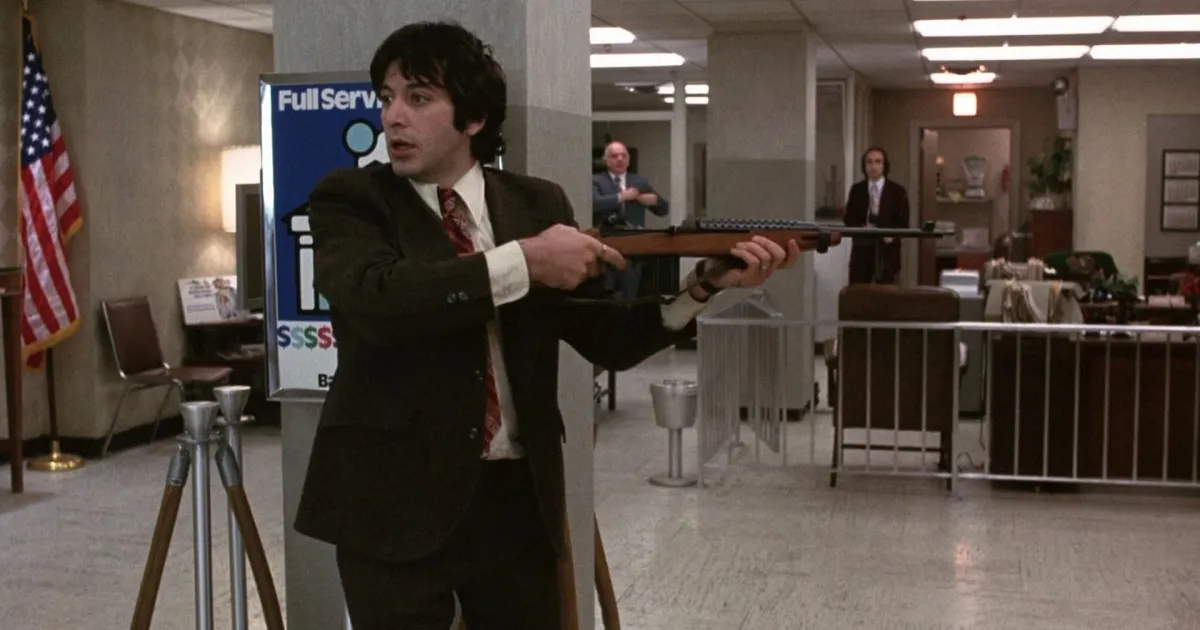
Fifty years ago today, Dog Day Afternoon made its theatrical debut, unleashing a crime drama unlike any other. Based on a mind-boggling true story, director Sidney Lumet’s (Murder on the Orient Express) film follows a first-time criminal (Al Pacino) and his partner (John Cazale) as they try to rob a Brooklyn bank. After the robbers make multiple mistakes and take hostages, what was supposed to be a quick theft soon turns into a full-blown media circus that changes everyone’s lives.
Following its premiere in 1975, Dog Day Afternoon received six Oscar nominations, including Best Picture, and won Best Original Screenplay for Frank Pierson’s script. After all this time, the movie’s legacy has endured. With its compelling performances, emotional story, and timely social commentary, Dog Day Afternoon has not lost its ability to connect with audiences.
Dog Day Afternoon is a thrilling, unpredictable story
Dog Day Afternoon starts off as a dark comedy centered around its bumbling, amateur robbers. As soon as the guns are brought out, one of the robbers chickens out and runs out of the bank. It is then revealed that most of the bank’s money has been cleared out, causing the robbery to fail as soon as it began.
Recommended Videos
Hilarious absurdity ensues as Sonny and Sal take people hostage. The characters hardly act like regular people would in their situation. The hostages become less concerned about their lives and are just excited to be on TV. Sonny even bonds with the hostages, teaching them how to use his gun.
Much like the hostages, the audience ends up sympathizing with the robbers, despite their actions. The film succeeds in humanizing Sonny and Sal by showing that the duo truly doesn’t want to kill anyone. Also, Al Pacino and John Cazale, both fresh off their successful work on The Godfather, imbue their characters with unique but irresistible energy.
The fantasy soon fades, and the script shifts. The film evolves into a heartfelt and tragic drama as tensions boil, dreams are dashed, and loyalties are tested. Though Sonny and Sal don’t want to hurt anyone, it becomes clear they won’t have a happy ending.
They were doomed as soon as they started the robbery. With Sal’s death injecting a harsh dose of reality into the audience, Dog Day Afternoon caps off its surprising narrative with a shocking, heartbreaking finale.
Its social commentary is still relevant
While the film is based on a caper that took place in the 1970s, audiences can still see the story of Dog Day Afternoon occurring in present-day America. For one thing, the film explores the ongoing flaws in America’s police force, specifically referencing the Attica prison riots, in which multiple people, including inmates and hostages, were killed as police tried to retake the facility. Thus, the film depicts Sonny surrounded by aggressive, trigger-happy cops who fail to handle the hostage situation safely and properly.
The cops even mistake a hostage, Howard (John Marriott), a Black security guard, as one of the bank robbers and pin him to a car. Though Sonny didn’t mention that one of the hostages was a man beforehand, the cops’ extreme response to the situation echoes real-life police brutality disproportionately directed toward Black people. Had Sergeant Moretti (Charles Durning) not stepped in to stop the other officers, Howard may not have left the bank alive.
The bystanders surrounding the bank are clearly fed up with this kind of police violence. Thus, Sonny becomes a heroic outlaw to the public when he stands up to the police. As soon as he screams “Attica,” Sonny wins the crowd over, waving his white flag around like a rock star and making it rain money on the crowd.
The film makes it clear that Sonny isn’t a traditional hero or villain. Nevertheless, audiences can still see people idolizing and glorifying criminals like Sonny, such as Luigi Mangione, for their extreme acts of rebellion against a flawed system that has angered so many.
It presents the LGBTQ+ community in a unique way
Dog Day Afternoon also broke new ground with its portrayal of the LGBTQ+ community. In a surprising twist, it is revealed that Sonny was trying to rob the bank to pay for a sex reassignment surgery for Leon (Chris Sarandon), his transgender wife. As soon as this truth is revealed, Sonny gains support and backlash from members of the LGBTQ+ community.
Members of the LGBTQ+ community have often been portrayed as campy, negative stereotypes. However, Dog Day Afternoon portrays Sonny and Leon with greater nuance and empathy, with Sarandon receiving an Oscar nomination for Best Supporting Actor for his bold performance as the latter.
Although Leon said Sonny was violent toward her, the film still presents them as complex, human beings striving for happiness. Since Leon had tried to commit suicide, thinking she would never be able to afford her operation, Sonny’s robbery was a misguided attempt to do the right thing.
Many people still see members of the LGBTQ+ community, like Leon, struggling to find joy as they continue to face violence, discrimination, and barriers to healthcare and mental health care.
Through it all, Dog Day Afternoon shows the lengths to which desperate people are willing to go in pursuit of happiness. Had Sonny and Leon gotten much more care and support from society, the robbery may not have occurred, and Sal would still have been alive.
Though Lumet’s film is now 50 years old, Dog Day Afternoon has aged like fine wine thanks to its relatable characters, spellbinding performances, and revolutionary narrative. This movie is a time capsule that both captures the social and political tensions of the ’70s and shows that people still see similar issues in modern America. With such timeless societal themes and a captivating story, Dog Day Afternoon can still lay claim to the honor of being one of the best movies in cinema history.



